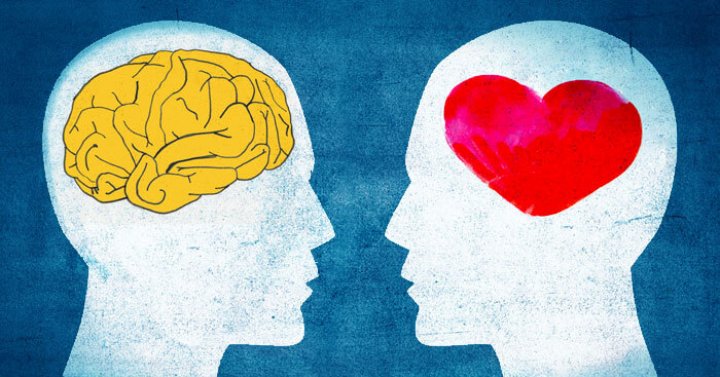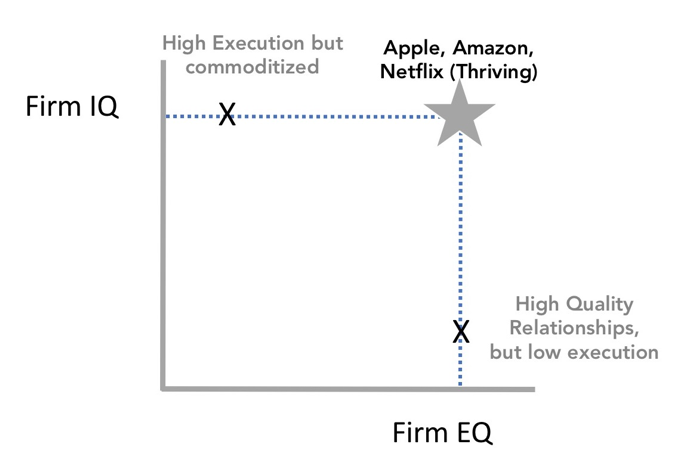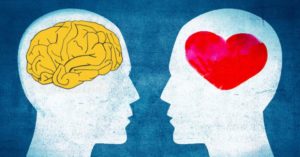 Written by Ikhlaq Sidhu UC Berkeley and Paris del E’traz, IE Business School.
Written by Ikhlaq Sidhu UC Berkeley and Paris del E’traz, IE Business School.
We have identified two types of mindsets that exist in firms today. One mindset is the traditional one that believes that success is based mostly on building superior products and services and that customers will automatically follow. The other mindset is based on the realization that today clients are demanding experiences and outcomes more than ever before and that establishing real relationships with customers is today’s secret to success.
As it turns out, many companies are discovering that today the traditional approach of efficient execution and superior products is being increasingly commoditized. And further, that the competitors of the future will not be the traditional ones.
In reality, a combination of both mindsets is important for success. These mindsets are not mutually exclusive, and each can be measured in the following manner:
- Firm IQ: This is the logical component of every organization. This includes all the people and capabilities that create products and new technologies. It’s also the part of the firm’s ethos that drives reliable and efficient execution.
- Firm EQ: This is the emotionally intelligent ethos of every organization. This EQ includes the people and capability that allows the firm to empathize with its customers by delivering engaging experiences that culminate in real customer relationships. It is also the social capability of the firm that is required to truly have genuine engagement with its customers, partners, employees and everyone else in the firm’s community.
So how does this relate to a typical firm and its success? Let’s start with the reality of competition in today’s world. Firm’s today live in intensely competitive environments and they constantly face downward pressure on prices and financial earnings. Most technology suppliers are commoditized to near zero margins. And new technologies like Data, AI, and machine learning based applications are starting to disrupt virtually every type of business today from finance to pharmaceuticals, healthcare to telecommunications. Amazon is now disrupting much more than just retailers. Literally, everyone is trying to figure out how they will compete in a world where whatever they make will probably be offered as a free or ultra-low-cost service by someone else.
And while all of this competition is going on, today’s firms look for relief by counting on differentiation, i.e. better or cheaper products, often supported by using the latest in new technologies. All of this sounds completely logical, particularly since it is usually driven by the high IQ part of the company’s mindset. The only problem is that what has worked in the past will not work in the future.
Firms that create differentiation today don’t do it with only with execution speed or technology advancement. The bigger factor of product and service innovation today is customer engagement and their ability to build genuine customer relationships. And to accomplish this, firms require more than IQ, they need an enterprise-wide EQ, or a seamless obsession with the customer’s experience across the entire organization, whether that experience is through people or aided by technology. It is what we call “Applied EQ.”
Name any of the more innovative, glamourized firms today (e.g. Amazon, Apple, Tesla, Netflix, etc.). Yes, they can execute. But what do they execute is the question? They execute in a manner to develop scalable and genuine customer engagement and relationships. For example, many firms sell phones and music listening devices, but Apple’s offerings emotionally connect, which means that people will stand in line all night to buy their next product — even if they don’t know why they need it. They have a relationship with Apple products. Netflix is the firm famous for creating 20 million customer relationships, but without relying on a customer support center. They did it with an algorithm and an engaging computer interface. Through this algorithm and the data they collect, Netflix knows better what you want, and they even know it before you know you want it (in many ways like Amazon). It’s very hard for other firms to compete with that. In the older Blockbuster Video model of the world, they tried to have customer relationship using live “people to people” conversations. The result was, of course, ineffective, and eventually Blockbuster became irrelevant.
In fact, we have now come to the point in our technology capability where machines and computer interfaces can detect and amplify emotional engagement. Your computer will soon know when you are losing interest in any topic and will be able to say to you, “why don’t we do this later when you are not distracted.”

Figure 1: Many firms could thrive if they execute well,
but EQ is the missing ingredient.
So, just like with people, success is a function of both the IQ and the EQ. And while execution and technology are necessary (IQ types of factors), success is at least equally and sometimes more related to emotional intelligence and effective relationship (EQ types of factors). This is true for firms, just as it is true for individuals. And take note, even the firm’s technology should support the emotional intelligent and empathetic needs of the firm and its customers. In fact, great technology-focused people can now truly add value to a firm in a way that could never be done before. The customer engagement and experience is now just as much a technical issue as it is a human-centric issue because of advances in software, AI, ML, and data.
This is where the Applied EQ comes in. So many firms already have execution skills and often they have a great advantage in the business logic and/or technical capability, but they still struggle. What they are missing is the EQ to maintain customer loyalty, understand the true needs, and set technology strategy that leads to meaning and purpose for the firm and its customers.
This is where so many CTO, CEO, and even McKinsey have gotten it wrong! The recommended actions for a firm’s strategy generally come in 2 unhelpful categories:
- Completely Naive: Let’s catch up, become more innovative, and use/acquire advanced technologies like Data, AI, Blockchain, Machine Learning, etc.
- Logical, but ineffective: Let’s look at our business purpose first. What is the business strategy? Then let’s see if and how technology can make it work better.
The second option does seem reasonable, but it is still missing the key elements of EQ which is the heart of the customer relationship. With Applied EQ, we are in a global dialog with firm leaders to insert the missing ingredient back into the planning and learning process. The path that we have seen to be most effective is the following:
The EQ Forward Path:
- The Reality Check: How would you make money if the cost of your current product or service was no cost or low cost? Who do you think you are competing with? Where could disruptions in your industry come from?
- The Response: What strategy will allow you to adapt to reality while considering the customer pain points?
- Your EQ Strategy: Do you know how best to engage with these target clients? Can you build genuine relationships? How? What emotional connection can our customers have with our products, services, and firms? What emotional need or larger purpose is related to our product, service, and customer relationships?
- Align the technology: Do you know how to leverage today’s emerging technologies to develop these engaging experiences and strategies? What role is Data playing in your firm? Do you know who else is collecting data on your customers? What is the innovation or technology can we invest in to scale our ability to emotionally connect
- Align the Human Capital: Who on your team has the best empathy for the customers. What is the best path forward from a low or moderate social/emotional engagement to a relationship that has a high level of social/emotional engagement?
Does your staff have the necessary level of EQ to take your firm to this next level with your customers? Today’s innovators at every level of the firm need a mindset which is obsessed with the needs of the customer and is truly empathetic with respect to engagement.
No longer is client satisfaction enough to scale your business, clients today are seeking out those companies that are obsessed with delivering client experiences that are seamless and engaging. You need to be obsessed with your client needs.
Our work in Big Data and Machine Learning has taken a new meaning, as what was once a “nice to have” is becoming a critical factor of what separates successful future firms from those that will be left behind. Even Startups and SMEs today need a Data Strategy that delivers on customer experiences.
The promise of Data has arrived. Is your firm ready for it?
 Written by Ikhlaq Sidhu UC Berkeley and Paris del E’traz, IE Business School.
Written by Ikhlaq Sidhu UC Berkeley and Paris del E’traz, IE Business School.
We have identified two types of mindsets that exist in firms today. One mindset is the traditional one that believes that success is based mostly on building superior products and services and that customers will automatically follow. The other mindset is based on the realization that today clients are demanding experiences and outcomes more than ever before and that establishing real relationships with customers is today’s secret to success.
As it turns out, many companies are discovering that today the traditional approach of efficient execution and superior products is being increasingly commoditized. And further, that the competitors of the future will not be the traditional ones.
In reality, a combination of both mindsets is important for success. These mindsets are not mutually exclusive, and each can be measured in the following manner:
- Firm IQ: This is the logical component of every organization. This includes all the people and capabilities that create products and new technologies. It’s also the part of the firm’s ethos that drives reliable and efficient execution.
- Firm EQ: This is the emotionally intelligent ethos of every organization. This EQ includes the people and capability that allows the firm to empathize with its customers by delivering engaging experiences that culminate in real customer relationships. It is also the social capability of the firm that is required to truly have genuine engagement with its customers, partners, employees and everyone else in the firm’s community.
So how does this relate to a typical firm and its success? Let’s start with the reality of competition in today’s world. Firm’s today live in intensely competitive environments and they constantly face downward pressure on prices and financial earnings. Most technology suppliers are commoditized to near zero margins. And new technologies like Data, AI, and machine learning based applications are starting to disrupt virtually every type of business today from finance to pharmaceuticals, healthcare to telecommunications. Amazon is now disrupting much more than just retailers. Literally, everyone is trying to figure out how they will compete in a world where whatever they make will probably be offered as a free or ultra-low-cost service by someone else.
And while all of this competition is going on, today’s firms look for relief by counting on differentiation, i.e. better or cheaper products, often supported by using the latest in new technologies. All of this sounds completely logical, particularly since it is usually driven by the high IQ part of the company’s mindset. The only problem is that what has worked in the past will not work in the future.
Firms that create differentiation today don’t do it with only with execution speed or technology advancement. The bigger factor of product and service innovation today is customer engagement and their ability to build genuine customer relationships. And to accomplish this, firms require more than IQ, they need an enterprise-wide EQ, or a seamless obsession with the customer’s experience across the entire organization, whether that experience is through people or aided by technology. It is what we call “Applied EQ.”
Name any of the more innovative, glamourized firms today (e.g. Amazon, Apple, Tesla, Netflix, etc.). Yes, they can execute. But what do they execute is the question? They execute in a manner to develop scalable and genuine customer engagement and relationships. For example, many firms sell phones and music listening devices, but Apple’s offerings emotionally connect, which means that people will stand in line all night to buy their next product — even if they don’t know why they need it. They have a relationship with Apple products. Netflix is the firm famous for creating 20 million customer relationships, but without relying on a customer support center. They did it with an algorithm and an engaging computer interface. Through this algorithm and the data they collect, Netflix knows better what you want, and they even know it before you know you want it (in many ways like Amazon). It’s very hard for other firms to compete with that. In the older Blockbuster Video model of the world, they tried to have customer relationship using live “people to people” conversations. The result was, of course, ineffective, and eventually Blockbuster became irrelevant.
In fact, we have now come to the point in our technology capability where machines and computer interfaces can detect and amplify emotional engagement. Your computer will soon know when you are losing interest in any topic and will be able to say to you, “why don’t we do this later when you are not distracted.”

Figure 1: Many firms could thrive if they execute well,
but EQ is the missing ingredient.
So, just like with people, success is a function of both the IQ and the EQ. And while execution and technology are necessary (IQ types of factors), success is at least equally and sometimes more related to emotional intelligence and effective relationship (EQ types of factors). This is true for firms, just as it is true for individuals. And take note, even the firm’s technology should support the emotional intelligent and empathetic needs of the firm and its customers. In fact, great technology-focused people can now truly add value to a firm in a way that could never be done before. The customer engagement and experience is now just as much a technical issue as it is a human-centric issue because of advances in software, AI, ML, and data.
This is where the Applied EQ comes in. So many firms already have execution skills and often they have a great advantage in the business logic and/or technical capability, but they still struggle. What they are missing is the EQ to maintain customer loyalty, understand the true needs, and set technology strategy that leads to meaning and purpose for the firm and its customers.
This is where so many CTO, CEO, and even McKinsey have gotten it wrong! The recommended actions for a firm’s strategy generally come in 2 unhelpful categories:
- Completely Naive: Let’s catch up, become more innovative, and use/acquire advanced technologies like Data, AI, Blockchain, Machine Learning, etc.
- Logical, but ineffective: Let’s look at our business purpose first. What is the business strategy? Then let’s see if and how technology can make it work better.
The second option does seem reasonable, but it is still missing the key elements of EQ which is the heart of the customer relationship. With Applied EQ, we are in a global dialog with firm leaders to insert the missing ingredient back into the planning and learning process. The path that we have seen to be most effective is the following:
The EQ Forward Path:
- The Reality Check: How would you make money if the cost of your current product or service was no cost or low cost? Who do you think you are competing with? Where could disruptions in your industry come from?
- The Response: What strategy will allow you to adapt to reality while considering the customer pain points?
- Your EQ Strategy: Do you know how best to engage with these target clients? Can you build genuine relationships? How? What emotional connection can our customers have with our products, services, and firms? What emotional need or larger purpose is related to our product, service, and customer relationships?
- Align the technology: Do you know how to leverage today’s emerging technologies to develop these engaging experiences and strategies? What role is Data playing in your firm? Do you know who else is collecting data on your customers? What is the innovation or technology can we invest in to scale our ability to emotionally connect
- Align the Human Capital: Who on your team has the best empathy for the customers. What is the best path forward from a low or moderate social/emotional engagement to a relationship that has a high level of social/emotional engagement?
Does your staff have the necessary level of EQ to take your firm to this next level with your customers? Today’s innovators at every level of the firm need a mindset which is obsessed with the needs of the customer and is truly empathetic with respect to engagement.
No longer is client satisfaction enough to scale your business, clients today are seeking out those companies that are obsessed with delivering client experiences that are seamless and engaging. You need to be obsessed with your client needs.
Our work in Big Data and Machine Learning has taken a new meaning, as what was once a “nice to have” is becoming a critical factor of what separates successful future firms from those that will be left behind. Even Startups and SMEs today need a Data Strategy that delivers on customer experiences.
The promise of Data has arrived. Is your firm ready for it?

